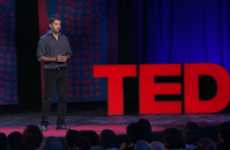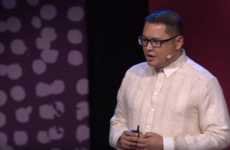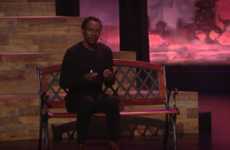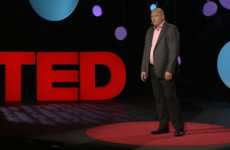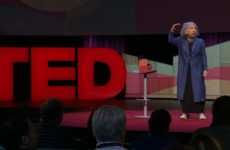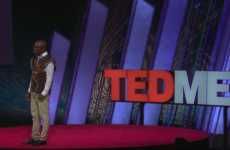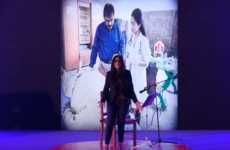
Need Inspiration?
Get inspired by 4,000+ keynote speaker videos & our founder, a top keynote speaker on innovation.
Nathalia Holt's Keynote on HIV Spotlights the Importance of PR Interference
Kalin Ned — January 22, 2019 — Keynote Trends
References: nathaliaholt & ted
Dr. Nathalia Holt is a research scientist and author who in her keynote on HIV makes the case of breaking the stigma in science. The speaker delivers a content-rich talk that draws on historical examples of addressing the rigidity of research -- an act that might as well mean life or death for many.
After a brief anecdote, Holt offers the audience a choice. If they had to deal with a chronic disease, which one would they rather be infected with -- diabetes or HIV. The speaker offers an intuitive guess that most would lean toward the former. Subsequently, she states that HIV is actually easier to manage and there are effective therapies that allow individuals to live normal lives. She pinpoints the motivation behind the expected decision on HIV's disastrous reputation.
To make her point during her keynote on HIV, Dr. Nathalia Holt draws on examples of chronic illnesses that have suffered from a bad reputation. For example, in the 40s talking about cancer was taboo and chemotherapy was regarded as a far reach. However, Mary Woodward Lascar -- a powerful socialite, decided to start a PR campaign that called for the ability to mention the disease on air, as well as run initiatives that raise awareness and pull donors. She completely restructured the Cancer Society and provided advocacy and funds (three million collected from extensive fundraising) for further research and development of chemotherapy. Although met with huge resistance from scientists and researchers, Mary Woodward Lascar was able to make a strong impact and a cultural shift in the history of cancer that allowed for huge advancements in treatment.
The keynote on HIV also details how tuberculosis research -- which faced similar issues in perception, was able to thrive thanks to a PR campaign. Today we have therapy and medicine that can cure most types of TB in six months.
Tying it to the topic at hand, Dr. Nathalia Holt briefly speaks about some of the issues an HIV diagnosis has faced in history and even today. Referred to as 'Gay Cancer' in the 80s, physicians would not even attempt to treat their patients. Communities in the mid-80s were plagued with desperation until it became public knowledge that there was an effective drug that could treat the disease but the FDA hadn't gotten around to approving it yet. The ordeal spiked activist campaigns that changed the game forever -- from the ability to enroll in clinical trials to the transparency about drugs that are in their developing stages.
Dr. Nathalia Holt's keynote on HIV ends on a contemporary example of treatment that involves gene-therapy and alludes to how even today, campaigning and writing about stigmatic environments can severely benefit those directly affected by the illness.
After a brief anecdote, Holt offers the audience a choice. If they had to deal with a chronic disease, which one would they rather be infected with -- diabetes or HIV. The speaker offers an intuitive guess that most would lean toward the former. Subsequently, she states that HIV is actually easier to manage and there are effective therapies that allow individuals to live normal lives. She pinpoints the motivation behind the expected decision on HIV's disastrous reputation.
To make her point during her keynote on HIV, Dr. Nathalia Holt draws on examples of chronic illnesses that have suffered from a bad reputation. For example, in the 40s talking about cancer was taboo and chemotherapy was regarded as a far reach. However, Mary Woodward Lascar -- a powerful socialite, decided to start a PR campaign that called for the ability to mention the disease on air, as well as run initiatives that raise awareness and pull donors. She completely restructured the Cancer Society and provided advocacy and funds (three million collected from extensive fundraising) for further research and development of chemotherapy. Although met with huge resistance from scientists and researchers, Mary Woodward Lascar was able to make a strong impact and a cultural shift in the history of cancer that allowed for huge advancements in treatment.
The keynote on HIV also details how tuberculosis research -- which faced similar issues in perception, was able to thrive thanks to a PR campaign. Today we have therapy and medicine that can cure most types of TB in six months.
Tying it to the topic at hand, Dr. Nathalia Holt briefly speaks about some of the issues an HIV diagnosis has faced in history and even today. Referred to as 'Gay Cancer' in the 80s, physicians would not even attempt to treat their patients. Communities in the mid-80s were plagued with desperation until it became public knowledge that there was an effective drug that could treat the disease but the FDA hadn't gotten around to approving it yet. The ordeal spiked activist campaigns that changed the game forever -- from the ability to enroll in clinical trials to the transparency about drugs that are in their developing stages.
Dr. Nathalia Holt's keynote on HIV ends on a contemporary example of treatment that involves gene-therapy and alludes to how even today, campaigning and writing about stigmatic environments can severely benefit those directly affected by the illness.
5.4
Score
Popularity
Activity
Freshness


